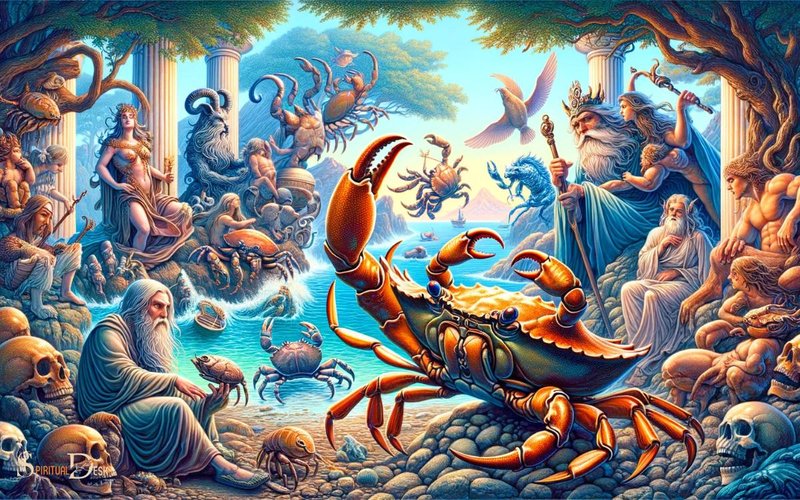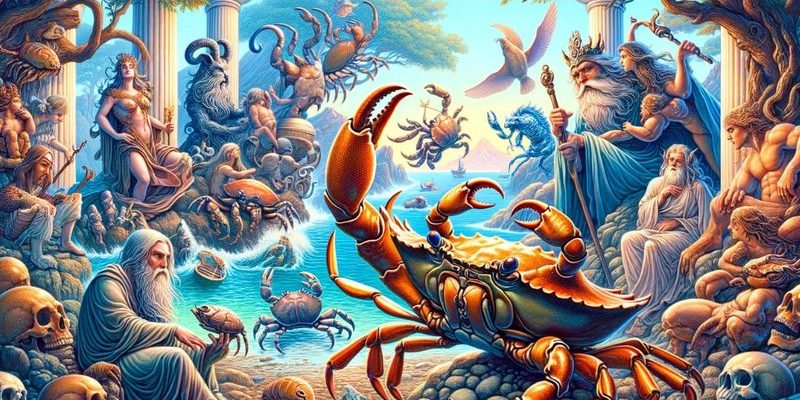
Crabs have been symbols of various things throughout history, from transformation to prosperity. Think of them as the ultimate chameleons of the sea. They adapt and flourish in diverse environments, and in many cultures, they embody important messages that resonate with human experiences. As we unravel the myths and beliefs surrounding these creatures, you might find some surprising connections to your own life. So, grab a cup of coffee, sit back, and let’s explore the captivating world of crabs and what they symbolize across different cultures.
Crabs in Mythology: A Symbol of Resilience
Crabs often appear in ancient myths and legends as symbols of resilience. In many cultures, they represent the ability to navigate tough situations. For example, in several Native American tribes, crabs are seen as powerful symbols of strength, often associated with water and adaptability. Just like crabs can thrive in both salt and freshwater, these cultures embrace the idea of overcoming challenges in various life circumstances.
In some Asian traditions, crabs are believed to embody good fortune. They’re often included in celebratory meals during festivals and important events. The notion here is that eating crabs can bring prosperity and happiness to families. Honestly, it’s a beautiful way to connect with nature and celebrate abundance, don’t you think?
Moreover, many stories portray crabs as tricksters, teaching lessons about humility and the consequences of pride. In these tales, crabs often outsmart larger animals, showing that size isn’t everything. This reinforces the idea that cleverness and adaptability can lead to success, no matter the odds stacked against you.
Cultural Beliefs: Crabs and Transformation
Transformation is another significant theme associated with crabs. You might be wondering why this is the case. Well, crabs go through a molting process where they shed their old shells to grow a new one. This fascinating change symbolizes renewal and growth in many cultures. In Japan, for example, the crab is celebrated during the “Chūnichi Gotō” festival, where it’s believed that eating crabs can help individuals experience personal transformations and new beginnings.
In some African cultures, crabs signify the journey of life—from struggle to empowerment. The crab’s ability to change and adapt serves as a metaphor for our own life journeys. Imagine navigating through storms and emerging stronger on the other side. That’s the essence of what crabs represent in these cultural tales.
You’ll find that crabs can also symbolize the importance of community. In some cultures, they are often depicted as social animals that thrive in groups, teaching us about the value of connection and teamwork. After all, isn’t life about growing together?
The Crab in Folklore: A Cautionary Tale
Cautionary tales featuring crabs are prevalent in many cultures. One popular story circles around a crab who was too proud of its skills, only to be outsmarted by other animals. These tales typically serve to teach important lessons about humility and the dangers of overconfidence.
In many Pacific Island cultures, such stories impart wisdom about respecting nature and understanding your place within it. They offer reminders that, while we may have certain strengths, it’s essential not to disregard others’ abilities. These narratives often resonate with audiences, encouraging reflection on personal behavior and its effects on community dynamics.
Moreover, crabs symbolize balance in these tales, reminding us that life is about finding harmony between our strengths and weaknesses. Just like in the natural world, where each creature has a role to play, our personal journeys involve recognizing how we fit into the larger tapestry of life.
Crabs and Superstitions: Good Luck or Bad Omen?
Superstitions surrounding crabs vary widely. In some cultures, crabs are considered good luck, especially when it comes to wealth and prosperity. For instance, in South Asia, bringing crabs into the home is often seen as a sign of upcoming financial good fortune. People might keep a crab in their home as a symbol to attract abundance, much like how some cultures use lucky charms or talismans.
On the flip side, in certain regions, crabs are associated with bad omens. For example, if a crab crosses your path, some believe it signifies impending trouble or upheaval. This highlights how diverse and sometimes contradictory beliefs can be. It’s interesting how the same creature can evoke such disparate feelings across different cultures, isn’t it?
Understanding these superstitions helps us appreciate the complexity of cultural beliefs regarding crabs. It’s a fascinating reflection of how humans interpret life’s events, using symbols and creatures to convey deeper meanings. Remember, the next time you spot a crab scuttling by, think about what it might symbolize in your own life!
Crabs in Art and Literature: A Creative Muse
Crabs have also made their way into art and literature, often embodying themes of perseverance and community. Artists have long used crabs to illustrate notions of survival and adaptability. In many paintings, crabs are depicted in their natural habitat, symbolizing the beauty and complexity of marine life.
Within literature, crabs often appear as characters that navigate challenges, much like human beings facing obstacles. They can represent the struggle against adversity, capturing the essence of persistence. This connection to human experience makes them relatable figures in stories, showing that we all have our battles to fight.
From poetry to modern novels, crabs serve as metaphors for life’s journey. They remind us that, much like these sea creatures, we must adapt and keep moving forward, even when the currents get tough.
The Crab as a Culinary Delight: Connecting Culture and Cuisine
Finally, let’s not forget the role of crabs in culinary traditions around the world. Crabs are not just creatures to admire; they’re also a beloved food item in many cultures, symbolizing community and celebration. In many coastal regions, crabs are prepared for special occasions, bringing families and friends together over shared meals.
In countries like China, crabs are featured prominently in festive dishes, especially during the Mid-Autumn Festival. Eating crabs during this time is believed to bring luck and happiness, reinforcing their connection to positive cultural beliefs.
In contrast, some cultures have unique ways of preparing crabs that reflect local traditions and flavors. From crab cakes to crab curry, these culinary delights showcase the versatility of crabs in various cuisines. Cooking and sharing these dishes often become a ritual that fosters connection and warmth among family and friends.
As we look at crabs in culinary contexts, it’s clear they are more than just food. They symbolize the importance of gathering, sharing, and celebrating life’s moments together.
Exploring the myths and cultural beliefs about crabs reveals a wealth of meaning that goes far beyond their appearance. From resilience and transformation to cautionary tales and culinary delights, crabs are woven into the fabric of many cultures in rich and varied ways.
So, the next time you encounter a crab—whether in nature, on your plate, or in stories—take a moment to appreciate the depth of symbolism they carry. They remind us of life’s complexities, challenges, and the beauty of connection. Embracing these beliefs can deepen our understanding not only of crabs but also of our own lives and the shared human experience.

